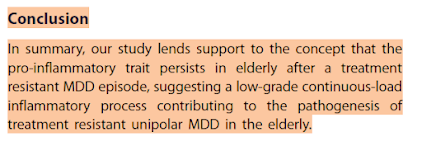Immune Markers in Geriatric Depression: New Data From Norway
Out on PubMed, from investigators in Norway and Sweden, is this study:
Persistent pro-inflammatory trait in elderly patients following treatment-resistant major depressive disorder: a longitudinal exploratory study.
Nord J Psychiatry. 2024 Dec 3:1-10. doi: 10.1080/08039488.2024.2432981. Online ahead of print.PMID: 39624907

Objectives: Considering that the remission rate for major depressive disorder (MDD) in elderly patients is below 50%, there is a compelling requirement for an enhanced comprehension of the underlying mechanisms. Chronic low-grade inflammation has been posited as one potential contributor to treatment-resistant MDD in the elderly. Accordingly, the objective of our study was to explore the longitudinal trends of systemic immune markers in elderly inpatients referred to electroconvulsive therapy due to an episode of treatment resistant unipolar MDD.
Methods: The study encompassed 64 elderly inpatients with unipolar MDD that had failed to respond to therapy in primary health care, and 18 non-depressed controls. Blood samples were collected at pre-treatment, mid-treatment, post-treatment and 12 weeks follow-up. We assessed 27 immune markers via multiplex assays. Depressive symptoms were evaluated using the Hamilton Rating Scale of Depression at these timepoints. For controls, the immune markers and depressive symptoms, were measured at baseline and eight weeks follow-up using identical methods.
Results: At follow-up, patients showed higher concentrations of 23 immune markers compared to controls, although the concentration of 19 immune markers decreased significantly from pre-treatment to follow-up. No differences in immune marker concentrations between treatment responders and non-responders were observed pre- and post-treatment in the patient group.
Conclusion: Our findings suggest that a pro-inflammatory trait persists in elderly after an episode of treatment resistant unipolar MDD. Thus, our study supports that chronic low-grade inflammation may characterise elderly with treatment-resistant unipolar MDD.
Keywords: Unipolar major depression; cytokines; immune markers; inflammation; older adults.
The article is here.
And from the text:
Here is a study from Norway that adds to our knowledge of immune markers in geriatric MDD patients treated with ECT. The markers are many, the immune system is complex and the methodologies have many limitations; thus, there is no simple, cohesive conclusion yet. But it does appear that depression is associated with an increase in immune markers of inflammation and ECT leads to their decrease acutely, but temporarily.
Kudos to our Norwegian colleagues for this interesting dataset.








Comments
Post a Comment